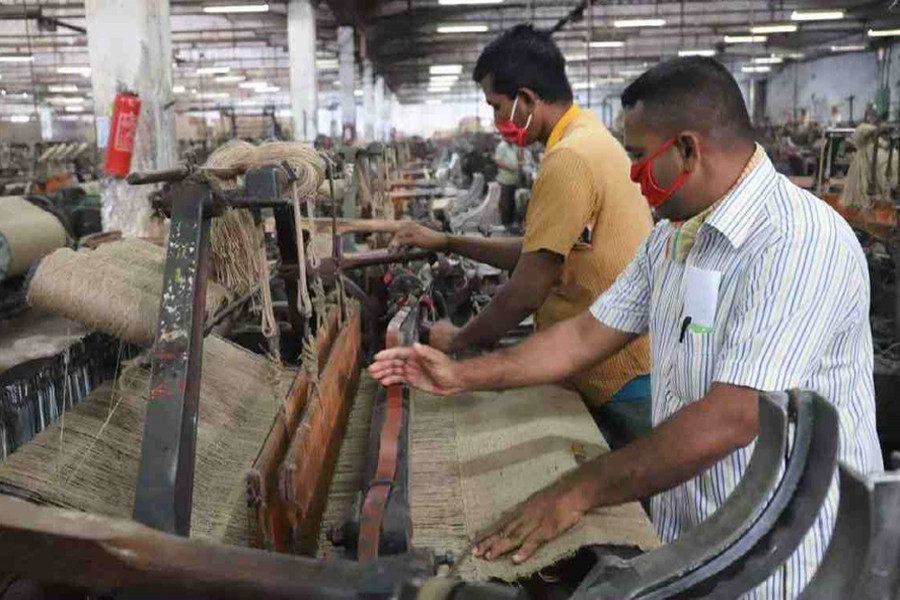When more than seven months back, the decision of shutting down the state-owned jute mills came as a bolt from the blue, there was more to it as the decision was coupled with a note of assurance from the jute and textile minister-of reopening the mills soon, under Public Private Partnership (PPP).
In a country of 'compulsive sceptics' who can barely afford a choice to take things on their face value, the statement of the minister on reopening the mills under PPP sounded hollow, if not outright incredulous. Hardly anyone believed it, though the authorities kept repeating it for a while - ostensibly to make the 25,000 or so retrenched workers believe in the fairytale. One must not forget that the shutdown decision as well as workers' job loss came at a time when the pandemic was set to threaten life and livelihood of millions, and assuring the jobless workers with a hollow promise was a plain mockery.
True, given that the state-owned jute mills were a burden on the government thanks to the mismanagement of BJMC, there was hardly any choice but to look for an alternative management modality to help the jute industry ride out the endemic crisis. But what had made the minister so optimistic to run the mills under PPP within months left many surprised for the simple reason that it was an unusual time, and relying on PPP which is yet to kick-start in the country in any form, was too far-fetched, perhaps self deceiving too.
Now, the cat is out of the bag. A nine-member inter-ministerial committee has reportedly finalised the terms and conditions of the lease contracts, and international tenders for this purpose might be issued shortly. According to the BJMC and ministry sources, it has been decided to lease out the mills for a period of 5 to 20 years through an open bidding system.
The idea of shutting down the mills was to cut mounting government expenses on the one hand and on the other (thinking piously), to modernise the mills through massive investment under PPP. Now that PPP prospect is gone, will lease-out help modernise the mills-- that too with private investment? Who is going to spend a huge amount of money for a short-term lease-- of 5 to 20 years?
Ideally, for a lease deal to work successfully, the time required is usually much longer. Potential investors would like to have satisfactory return from their money invested. And where will the money come from if banks and financial institutions do not consider the lease-tenure long enough to recover their loans? Besides, the unsettled financial liabilities of these sick mills will be a cause of worry to investors. Reports published in newspapers say that unpaid loans of these mills in various banks amount as high as to Tk 10 billion. Over and above, according to a local daily, these mills owe more than Tk 2.50 billion to raw jute merchants. Clearly, lease deals pending clearance of unsettled financial issues would lead to serious legal problems, affecting the banks in particular.
Observers, for good reasons, are critical of the sudden shift in the decision from PPP to leasing. While leasing itself is often associated with political considerations, experience of leasing out state-owned enterprises in the past speaks of utter disregard for the terms of lease contracts. In case of the proposed lease of the jute mills, it has been learnt that the BJMC would monitor the functioning of the mills once these are in private hands. Given that it is the BJMC often blamed for the ill-fated mills, it is ironic to see it in the new role to hold the reigns of the mills under a new arrangement. It was observed in the past that far from complying with the terms of lease contracts, investors tend to misuse the vacant lands of the mills by setting up large-scale dairy farms, poultry and fishing projects which for them are more alluring than the leased-out enterprises. This may have prompted the authorities this time to lease out only the mills and not the lands.
There is more to the issue. It appears that the authorities are still not sure how to go about the leasing process. They are particularly worried whether investors would be interested to come forward, since running the mills would require, in the first place, considerable investment in terms of replacing the machinery and equipment as well as introducing newer technology for product diversification as envisaged.
The mills are state property and the onus is on the government to look after them--- be it through modernisation or under any other suitable scheme --- and turn them profitable. Having failed totally over a long period of time, the government is set to shrug off its responsibility in the name of leasing out which most observers believe will snuff whatever prospect there might be to rescue the mills.


